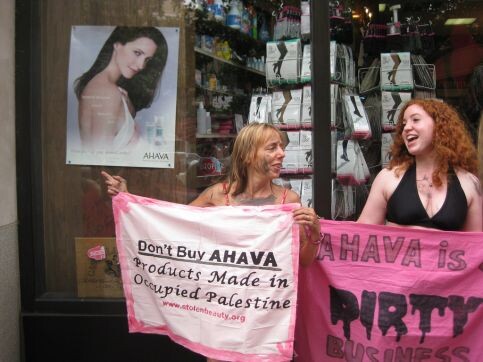The Electronic Intifada 17 June 2010

Activists protest outside of a US store selling Ahava products. (Stolen Beauty)
In France, the campaign to boycott Ahava Dead Sea cosmetics has entered a new phase with boycott, divestment and sanctions advocates taking legal action against the Sephora cosmetics retail chain’s contract with the company.
Ahava manufactures its cosmetics in a factory in the illegal Mitzpe Shalem settlement in the occupied West Bank. However, Ahava labels its skin care products as originating from “The Dead Sea, Israel.” The Israeli settlements of Mitzpe Shalem and Kaliya co-founded Ahava’s factory Dead Sea Laboratories and own 44 percent of the shares of the company. Both Mitzpe Shalem and Kaliya are close to the shores of the Dead Sea, exploiting it for tourism. The mud used in Ahava products is taken from a site near Kaliya, along the occupied shores of the Dead Sea. Ahava uses Palestinian natural resources without permission and compensation. In addition, Ahava runs an information center for tourists in the Mitzpe Shalem settlement.
In its authoritative ruling in 2004, the International Court of Justice (ICJ) reaffirmed the illegality of settlement construction, which includes the construction of industrial sites in the settlements. Ahava’s factory and tourist center are therefore built in violation of international law.
Ahava’s firm connection with Israeli settlements is at the heart of the legal action undertaken by the French-based Coordination des Appels pour une Paix Juste au Proche Orient (CAPJPO) against Sephora at the end of May. Sephora, a division of the Louis Vuitton Moet Hennessy Group (LVMH), sells Ahava cosmetics in its stores. For almost a year activists have protested the store’s retailing of Ahava products, calling on the public to support the protest by sending messages to the French company appealing to them to take the products off their shelves (Boycott of Ahava Dead Sea products makes an impact”). Sephora has refused to do so and is now been taken to court by CAPJPO, which claims that the company’s contract with Ahava is illegal because the cosmetics are produced in illegal settlements. In its complaint that was filed to the court of Nanterre at the end of May, CAPJPO argues that in retailing Ahava products, Sephora is supporting the violation of international law.
Palestine solidarity activists in the US have also embarked upon boycott campaigns targeting Ahava.
In the US, Ahava is sold by Ricky’s NYC, a family-owned chain store in New York City, Lord & Taylor in Washington, and Nordstrom department stores amongst other retailers. The department stores have drawn the attention of activists from the American peace group CodePink. CodePink’s Stolen Beauty Campaign targets Ahava Dead Sea cosmetics with colorful protests that include the messages “Ahava is dirty business” and “Ahava puts a pretty face on its crimes.”
The CodePink campaign and the work of other solidarity groups has had an impact. Bad publicity caused Sex & the City star Kristin Davis to be dropped as a spokesperson for Ahava and as a goodwill ambassador for the international organization Oxfam after activists called on her to end her paid promotional appearances for Ahava.
Activists with CodePink, dubbed the Pink Police, have also undertaken direct action to “block the crime scenes” in the stores where the Ahava products are sold (BDS Austin Activism — Ahava Protest”). Activists have sent letters to Nordstrom, explaining that selling Ahava products contradicts the company’s membership in Business for Social Responsibility, a global nonprofit organization. Ahava has attempted to deflect criticism and defend its theft of Palestinian resources by claiming that “The Dead Sea and its treasures are international and do not belong to one nation.”
Meanwhile, CodePink has called on the publisher of the The Lonely Planet travel guides to drop a recommendation in future editions of the Israel and the Palestinian Territories Guidebook for shopping at the Ahava Factory Outlet and Store, based in the Mitzpe Shalem settlement. CodePink informed The Lonely Planet editors of an international boycott campaign against Ahava Dead Sea Laboratories because of the company’s illegal practices. The Lonely Planet publicist has replied that the comment would be forwarded to the editor and authors.
Despite its tarnished image, Ahava plans to open a flagship store in New York City, in addition to its international stores in Berlin, London and Singapore. Last year, it began collaborating with Teva Nederland to promote its products to Dutch pharmacies. Teva Nederland — a market leader in generic medicines, serving the majority of Dutch pharmacies — is a subsidiary of Teva Pharmaceutical Industries, Ltd., an Israeli company with branches in North America, Latin America, Europe, Africa and Asia. Teva Nederland introduced Ahava in fifty pharmacies in 2009 and planned to expand this number to 300 in 2010. In addition, the Israel Export & Cooperation Institute reported in April on a possible joint venture between Teva Pharmaceutical Industries and Ahava cosmetics to develop a dermo-cosmetics line together.
However, the boycott campaign will make it difficult for Ahava to expand its markets. At the end of 2009, in response to a call from the Dutch Bathrobes Brigades, a group campaigning for a boycott of Ahava cosmetics, several Dutch pharmacists expressed their support of the campaign and stated their refusal to put Ahava products on their shelves. Solidarity activists will continue to make an impact on Ahava’s profit margins as the international boycott movement gains steam in the wake of Israel’s attack on the Gaza Freedom Flotilla in international waters.
Adri Nieuwhof is a consultant and human rights advocate based in Switzerland.





